Thousands of people yesterday marched from the headquarters of the Democratic Progressive Party (DPP) to the Executive Yuan in Taipei, urging the Cabinet to withdraw its draft amendment to the Labor Standards Act (勞動基準法).
At noon, protesters gathered in front of the headquarters and started to march toward the Legislative Yuan at about 3pm.
One of the organizers, the Taiwan Railway Union, estimated a turnout of more than 10,000 people in the afternoon.
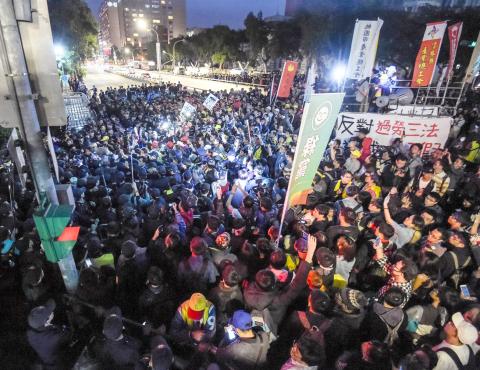
Photo: Huang Yao-cheng, Taipei Times
Several scuffles broke out between protesters and police when police tried to narrow down the demonstration area at the intersection between the Zhongshan N Road and Zhongxiao E Road.
Instead of continuing their march along Zhongxiao W Road, the organizers urged protesters to stage a sit-in at the intersection and wait for the Cabinet to respond to their appeal, but they received no response and dismissed the demonstration at 6pm.
Despite the dismissal, some protesters were still occupying the intersection as of press time last night.
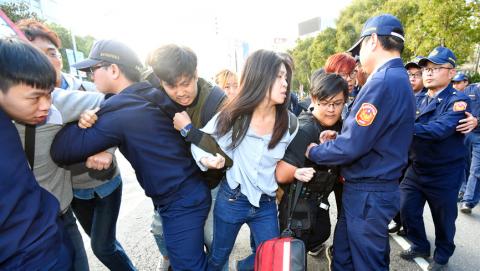
Photo: Liu Hsin-de, Taipei Times
Prior to the dismissal, some protesters tried to break through a police blockade set up in front of the Executive Yuan complex.
One member of the Social Democratic Party, surnamed Lu (呂), was forcibly removed from the scene by police, with his left ear allegedly cut on the wired barricades.
Since the Cabinet announced the draft amendment on Nov. 9, many labor rights groups have been protesting against what they said is the most retrogressive amendment to the act, which was pushed to a second reading by DPP lawmakers on Dec. 4.
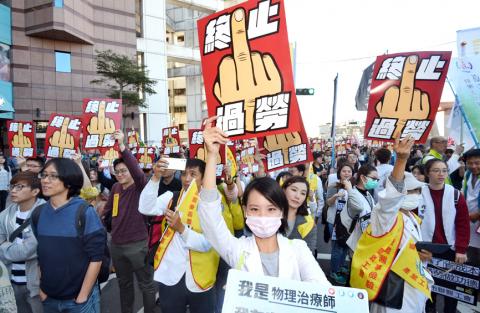
Photo: Liu Hsin-de, Taipei Times
Anticipating the demonstration yesterday, Cabinet spokesperson Hsu Kuo-yung (徐國勇) and Minister of Labor Lin Mei-chu (林美珠) tried to clarify what they called a “misunderstanding” about the draft amendment at a news conference on Thursday.
In the Cabinet’s draft, Article 34 proposes that the interval between two work shifts can be reduced from 11 hours to no less than eight hours if an employer obtains approval from its workers’ union.
Most people oppose the article because they do not understand its two premises: It only applies to those who have to work in shifts, and people are not allowed to work more than 12 consecutive hours, Hsu said.
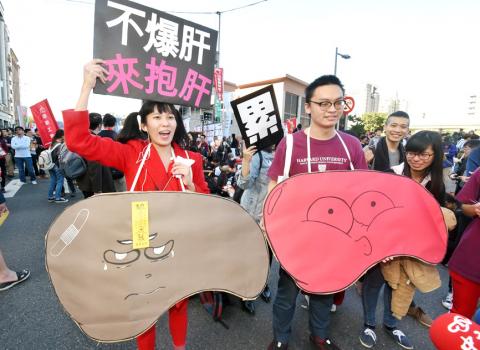
Photo: Liu Hsin-de, Taipei Times
The work schedule of employees can be changed once a week at most, but the restriction becomes irrelevant when employers and employees reach an agreement, according to the draft.
Some lawmakers have tendered motions that propose businesses should obtain the ministry’s approval before they are allowed to shorten workers’ rest intervals, Lin said, adding that the ministry thinks the proposal is feasible and would include it in the final draft.
No one misunderstood the articles, at least the Taipei City Government did not, Taipei Department of Labor Commissioner Lai Hsiang-lin (賴香伶) said yesterday when asked to comment on Hsu’s explanation.
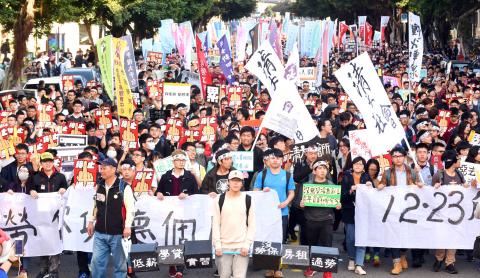
Photo: Liu Hsin-de, Taipei Times
Many hospital management teams, due to staff shortages, are likely to change workers’ schedules almost every day, which is a fact that the Cabinet fails to understand, Lai said, adding that it should encourage businesses to hire more workers instead of easing regulations.
The ministry should set up a registration system and ask businesses adopting shifts to fully reveal their schedule information, she said.
If businesses are to lengthen employees’ working hours, they should obtain approval from the ministry, which could be helpful to prevent employers from abusing the loosened regulation, she added.
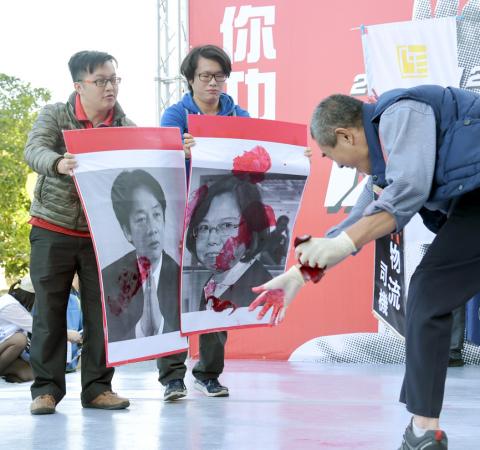
Photo: Huang Yao-cheng, Taipei Times
Employers are likely to force workers to sign agreements that say that they agree with the lengthened work schedules, Taiwan Higher Education Union department director Lin Po-yi (林柏儀) said.
People who have to work in shifts, such as guards, nurses and drivers in the logistics industry, are relatively powerless in society, Lin Po-yi said, adding that the draft amendment would worsen their already poor working conditions.
The DPP has forsaken the public, who cannot but take to the streets to defend its values, Chinese Nationalist Party (KMT) Legislator Chiang Wan-an (蔣萬安) said.
Asked if the KMT has any strategies to boycott the draft amendment in the extraordinary legislative session next month, Chiang said that party members are discussing plans, but cannot reveal them at the moment.
During a visit to Tainan yesterday, Premier William Lai (賴清德) said he would ask the Ministry of Labor to collect the appeals of protesters, but no further response could be solicited from the Cabinet as of press time last night.

MAKING WAVES: China’s maritime militia could become a nontraditional threat in war, clogging up shipping lanes to prevent US or Japanese intervention, a report said About 1,900 Chinese ships flying flags of convenience and fishing vessels that participated in China’s military exercises around Taiwan last month and in January last year have been listed for monitoring, Coast Guard Administration (CGA) Deputy Director-General Hsieh Ching-chin (謝慶欽) said yesterday. Following amendments to the Commercial Port Act (商港法) and the Law of Ships (船舶法) last month, the CGA can designate possible berthing areas or deny ports of call for vessels suspected of loitering around areas where undersea cables can be accessed, Oceans Affairs Council Minister Kuan Bi-ling (管碧玲) said. The list of suspected ships, originally 300, had risen to about

DAREDEVIL: Honnold said it had always been a dream of his to climb Taipei 101, while a Netflix producer said the skyscraper was ‘a real icon of this country’ US climber Alex Honnold yesterday took on Taiwan’s tallest building, becoming the first person to scale Taipei 101 without a rope, harness or safety net. Hundreds of spectators gathered at the base of the 101-story skyscraper to watch Honnold, 40, embark on his daredevil feat, which was also broadcast live on Netflix. Dressed in a red T-shirt and yellow custom-made climbing shoes, Honnold swiftly moved up the southeast face of the glass and steel building. At one point, he stepped onto a platform midway up to wave down at fans and onlookers who were taking photos. People watching from inside

Japan’s strategic alliance with the US would collapse if Tokyo were to turn away from a conflict in Taiwan, Japanese Prime Minister Sanae Takaichi said yesterday, but distanced herself from previous comments that suggested a possible military response in such an event. Takaichi expressed her latest views on a nationally broadcast TV program late on Monday, where an opposition party leader criticized her for igniting tensions with China with the earlier remarks. Ties between Japan and China have sunk to the worst level in years after Takaichi said in November that a hypothetical Chinese attack on Taiwan could bring about a Japanese

The WHO ignored early COVID-19 warnings from Taiwan, US Deputy Secretary of Health and Human Services Jim O’Neill said on Friday, as part of justification for Washington withdrawing from the global health body. US Secretary of State Marco Rubio on Thursday said that the US was pulling out of the UN agency, as it failed to fulfill its responsibilities during the COVID-19 pandemic. The WHO “ignored early COVID warnings from Taiwan in 2019 by pretending Taiwan did not exist, O’Neill wrote on X on Friday, Taiwan time. “It ignored rigorous science and promoted lockdowns.” The US will “continue international coordination on infectious